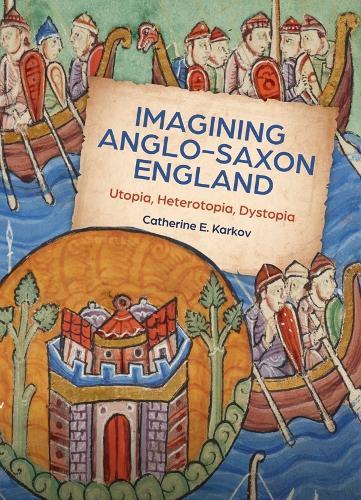Overview
A fresh approach to the construction of ""Anglo-Saxon England"" and its depiction in art and writing. This book explores the ways in which early medieval England was envisioned as an ideal, a placeless, and a conflicted geography in works of art and literature from the eighth to the eleventh century and in their modern scholarly and popular afterlives. It suggests that what came to be called ""Anglo-Saxon England"" has always been an imaginary place, an empty space into which ideas of what England was, or should have been, or should be, have been inserted from the arrival of peoples from the Continent in the fifth and sixth centuries to the arrival of the self-named ""alt-right"" in the twenty-first. It argues that the political and ideological violence that was a part of the origins of England as a place and the English as a people has never been fully acknowledged; instead, the island was reimagined as a chosen land home to a chosen people, the gens Anglorum. Unacknowledged violence, however, continued to haunt English history and culture. Through her examination here of the writings of Bede and King Alfred, the Franks Casket and the illuminated Wonders of the East, and the texts collected together to form the Beowulf manuscript, the author shows how this continues to haunt ""Anglo-Saxon Studies"" as a discipline and Anglo-Saxonism as an ideology, from the antiquarian studies of the sixteenth century through to the nationalistic and racist violence of today.
Full Product Details
Author: Catherine E. Karkov
Publisher: Boydell & Brewer Ltd
Imprint: The Boydell Press
Volume: v. 21
Dimensions:
Width: 15.60cm
, Height: 2.40cm
, Length: 23.40cm
Weight: 0.001kg
ISBN: 9781783275199
ISBN 10: 1783275197
Pages: 282
Publication Date: 20 March 2020
Audience:
Professional and scholarly
,
College/higher education
,
Professional and scholarly
,
Professional & Vocational
,
Tertiary & Higher Education
Format: Hardback
Publisher's Status: Active
Availability: In Print

This item will be ordered in for you from one of our suppliers. Upon receipt, we will promptly dispatch it out to you. For in store availability, please contact us.
Reviews
Importantly, Karkov has positioned her voice within a monograph, which enables her to develop a sustained and complex argument that asks her reader to think deeply and honestly about issues that have been the subject of much division and derisiveness. The importance of what Karkov has done for the field of early medieval studies by writing Imagining Anglo-Saxon England cannot be overstated. * The Medieval Review * [O]ne of the most important studies of early medieval identity published in the past twenty years. . . . This monograph is not only impeccably researched and forcefully argued, but it also has the rare (and hopefully increasingly common) quality in medieval scholarship of being unequivocally important. As medieval studies (and Anglo-American society more broadly) attempts to confront its own colonial and racialized past, Catherine Karkov has identified a good place to start. * Comitatus * Sharply incisive, unflinchingly direct, and the best kind of provocative, Catherine Karkov's Imagining Anglo-Saxon England provides one of the most cogent accounts to date of the fraught history of Anglo-Saxon studies. ...Imagining Anglo Saxon England takes important steps towards bridging the chasm between acknowledgment of the field's past harms and hope for its newly envisioned future. * SPECULUM * The book is uncompromising in its response to a turbulent world and changing field and is sure to be influential. -- TOEBI Newsletter
Importantly, Karkov has positioned her voice within a monograph, which enables her to develop a sustained and complex argument that asks her reader to think deeply and honestly about issues that have been the subject of much division and derisiveness. The importance of what Karkov has done for the field of early medieval studies by writing Imagining Anglo-Saxon England cannot be overstated. * THE MEDIEVAL REVIEW * [O]ne of the most important studies of early medieval identity published in the past twenty years. . . . This monograph is not only impeccably researched and forcefully argued, but it also has the rare (and hopefully increasingly common) quality in medieval scholarship of being unequivocally important. As medieval studies (and Anglo-American society more broadly) attempts to confront its own colonial and racialized past, Catherine Karkov has identified a good place to start. * COMITATUS * Sharply incisive, unflinchingly direct, and the best kind of provocative, Catherine Karkov's Imagining Anglo-Saxon England provides one of the most cogent accounts to date of the fraught history of Anglo-Saxon studies. ...Imagining Anglo Saxon England takes important steps towards bridging the chasm between acknowledgment of the field's past harms and hope for its newly envisioned future. * SPECULUM * The book is uncompromising in its response to a turbulent world and changing field and is sure to be influential. -- TOEBI NEWSLETTER
Briskly written and including a rich bibliography and references to current scholarship, the book casts a wide net into both critical theory and Anglo-Saxon studies. It deserves a wide audience.--CHOICE
Briskly written and including a rich bibliography and references to current scholarship, the book casts a wide net into both critical theory and Anglo-Saxon studies. It deserves a wide audience. * CHOICE * Importantly, Karkov has positioned her voice within a monograph, which enables her to develop a sustained and complex argument that asks her reader to think deeply and honestly about issues that have been the subject of much division and derisiveness. The importance of what Karkov has done for the field of early medieval studies by writing Imagining Anglo-Saxon England cannot be overstated. * The Medieval Review *
Author Information
CATHERINE E. KARKOV is Professor Emeritus of Art History, University of Leeds.




